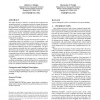Free Online Productivity Tools
i2Speak
i2Symbol
i2OCR
iTex2Img
iWeb2Print
iWeb2Shot
i2Type
iPdf2Split
iPdf2Merge
i2Bopomofo
i2Arabic
i2Style
i2Image
i2PDF
iLatex2Rtf
Sci2ools
128
click to vote
ATAL
2005
Springer
2005
Springer
Modeling exceptions via commitment protocols
This paper develops a model for exceptions and an approach for incorporating them in commitment protocols among autonomous agents. Modeling and handling exceptions is critical for successful applications of multiagent systems. Protocols help build multiagent systems, but traditional representations (such as finite state machines or Petri nets) inadequately model complex interactions and exceptions therein. Emerging commitment-based representations are promising, because they declaratively reflect the semantics of an interaction. However, current approaches lack a strong treatment of exceptions. This paper treats both expected and unexpected exceptions. A commitment protocol is modeled as a set of computations, each representing an allowed interaction and showing the evolving commitments of the participants. Exceptions are modeled via preference structures induced on these sets of computations. The preference structures statically show how expected exceptions are handled whereas the ...
Related Content
| Added | 26 Jun 2010 |
| Updated | 26 Jun 2010 |
| Type | Conference |
| Year | 2005 |
| Where | ATAL |
| Authors | Ashok U. Mallya, Munindar P. Singh |
Comments (0)

